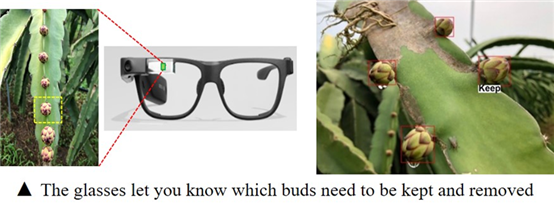Shipment volume of the global smart glasses industry is estimated to reach 310,000 units in 2021 and grow at a whopping 163.2%, according to MIC (Market Intelligence & Consulting Institute), a major government think tank and a leading IT research institute in Taiwan. The industry is forecast to grow by a CAGR (Compound Annual Growth Rate) of over 80% during the forecast period 2018-2025 to reach seven million units by 2025. Smart glasses have been widely adopted in various industries, including agriculture.
While the importance of agriculture to the Taiwanese economy has declined from its heyday, Taiwan still has a reputation as a fruit kingdom. The improvements in agricultural production technology have helped farmers secure yield stability and quality in fruit and vegetable crops. Take dragon fruits as an example, the total dragon fruit farm areas in Taiwan have exceeded over 3,000 hectares. However, the prices of dragon fruits have been affected significantly in summer to approximately US$1.1 per kg which is not enough to cover the cost. For this reason, the Industrial Development Bureau (IDB) of the Ministry of Economic Affairs (MoEA) of Taiwan. has joined forces with Pingtung county government and a Taiwanese communications company U-Sync Internet Service Co. (Taiwan) to establish a smart demo field in Dragon Digital Farm Co., Taiwan's largest dragon fruit farm. U-Sync provides low-cost IoT sensors with a built-in SIM card and solar power supply features while establishing a Digital Twin model with farming data to provide farmers standard farming guidelines so they do not need to spend 5-10 years to figure out how to. With this model, the company can quickly obtain winter-production technology and it is estimated that each hectare of farm can increase the income up to NT$600,000 (US$21,945.9).
Illustration of U-Sync Solution

With AI-controlled LED lights, the solution is able to provide supplemental lighting at farms to give dragon fruits sufficient sunlight especially in winter. The adoption of AI is used to calculate the lighting time.
Illustration of U-Sync Solution’s AI-controlled LEDs

With AI-controlled AR glasses, the solution is able to identify flower buds with up to 90% accuracy rate and reduce the human error rate by 20%.
Illustration of AI-controlled Glasses Developed by U-Sync.

Other than Taiwan, this AI-based dragon fruit planting solution has also been exported to Indonesia and Malaysia, which implemented on 10 or 15 hectares of farms as a trial before expanding to 500 hectares. At present, over 300 Taiwanese companies have participated in the Smart City Taiwan Project initiated by Taiwan’s government that has incubated more than 220 smart services in Taiwan and has benefited over 8.54 million Taiwanese people.
For future receipt of press releases, please subscribe here.
To know more about MIC research findings, please access our website.